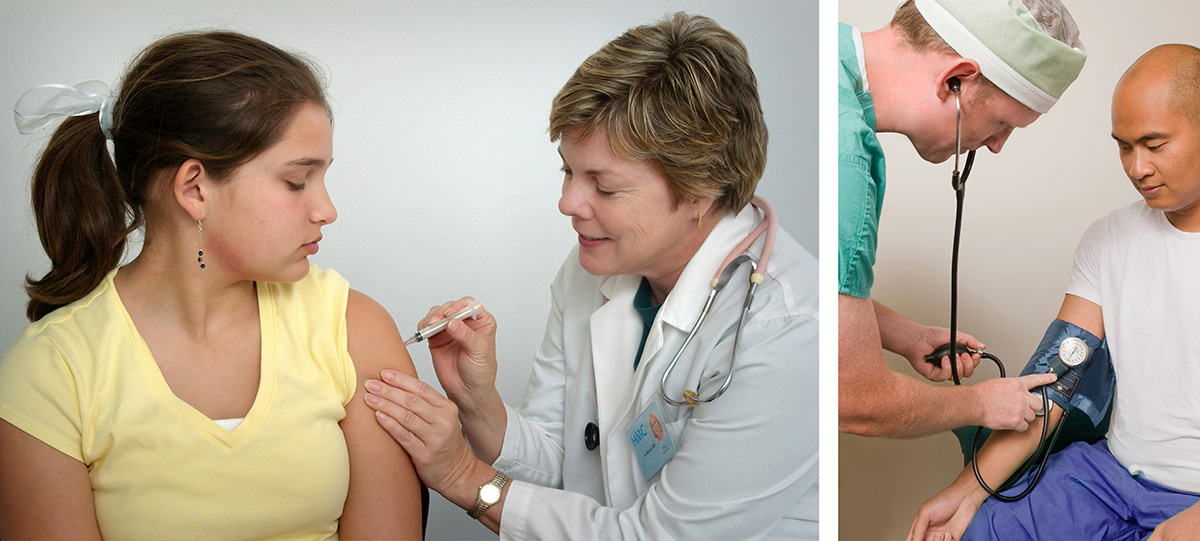
What is the I-693 exam?
An I-693 exam is a medical examination required by the United States Citizenship and Immigration Services (USCIS) for certain immigration processes. This exam is conducted to assess the health of an immigrant seeking adjustment of status to permanent residency or seeking admission to the United States. The exam is performed by a designated civil surgeon who completes Form I-693, which includes a physical examination, a review of medical history, and a vaccination history.
What is the intent of the I-693 exam?
The purpose is to ensure that immigrants do not pose a public health risk and to fulfill the health-related requirements for immigration. This exam is not a substitute for your annual physical or well-check exam. The exam only focuses on a handful of infections and medical conditions that could be a risk to public health. The vaccines required for this exam are only for the specific infections related to this exam. Based on your age and health, you might want to consider other vaccines just for your well-being.
Where can I get the exam?
You must get this exam from a designated civil surgeon. Exams completed by other health care professionals will not be accepted. See how to pick a certified U.S. civil surgeon.
When should I get the exam?
Ideally, plan to complete the exam about a month before you plan to send in your I-485. Later than that and your exam might not be ready soon enough. Have your exam with the civil surgeon before trying to get any additional vaccines. The civil surgeon can tell you exactly what vaccines you need based on your age, risk factors, and overall health.
What should I bring to the exam?
1. Vaccine records
Bring printed hard copies of your entire vaccine history. The civil surgeon is required to keep copies of these records since USCIS may at any time request them.
What counts as a vaccine record: The record must be an official clinic record or from a government health authority. Your name and birthdate need to appear clearly on each page of the record. The record must contain the names and dates of the vaccines provided.
Records from other countries: USCIS will accept records from any country in any language. If your vaccine records are not in English, also bring a translation of the records. This does not need to be a certified translation.
Don’t have records for some or all of your past vaccines? Not a problem. You can just get your booster vaccines for any vaccine for which you can not show written proof. For some of the vaccine requirements, you can take blood tests to see if you are still immune from prior vaccination. Your civil surgeon can help you figure out which options are best for you.
2. Test results
In some cases, you may provide printed hard copies of laboratory evidence of immunity in place of some vaccines. This can be done for MMR, varicella, hepatitis A, and hepatitis B. It must be an official laboratory report that clearly shows your name, the name of the test performed, the results, and the date of the specimen collection.
If you had a positive TB blood test in the past, bring documentation of that test, your most recent chest X-rays, and documentation of treatment.
If you had a positive syphilis test in the past, bring documentation of your most recent RPR (rapid plasma reagin) tests and documentation of treatment.
3. Photo ID
A government-issued photo ID with your legal name. The name that appears on your ID is the name that the civil surgeon will use on your I-693. If you have changed your name, bring legal documentation of the name change.
On the day of your exam
- Organize your documents before your appointment. Present legible hard copies of all your vaccines and test results.
- Be well hydrated: You will need to provide urine and/or blood samples, so being well hydrated helps blood draws go smoothly.
- You do not need to fast for this exam: Blood tests will be for infectious diseases, which are not affected by what you eat or drink. So you can eat or drink anything you want before your appointment.
- Show up for your appointment. The civil surgeon has reserved time for you and has prepared for your arrival. Many civil surgeons charge fees for no-shows, and some even require a deposit when scheduling.
- Show up on time or early. This ensures enough time for a proper exam to collect all the required information and prepare documents correctly. This is not a process you want to rush, since rushing can introduce errors or omissions.
- Bring your documents, ID, and a form of payment. Health insurance will not pay for services related to immigration.
After your exam
- Wait the indicated timeframe you are told at your appointment. Lab tests must be submitted by the civil surgeon, and it takes some time to receive those results. In most cases and in most parts of the country, lab results should return within 3 to 5 business days. In some rural areas, it might take longer.
- If the civil surgeon informs you that you are missing vaccines or other testing or treatment, resolve that as soon as possible, then send documentation to the civil surgeon.
- Answer any phone or email messages from your civil surgeon. Additional steps might be required of you based on your exam and lab results.
- The I-693 documents must be signed in ink by both the applicant and civil surgeon before being sealed in an envelope. If your civil surgeon did not have you sign at your first appointment, you will need to sign at a second appointment.
- If you had a translator or preparer (legal guardian) at your appointment with the civil surgeon, they must also sign the document.
- Most civil surgeons give you an opportunity to review your personal information on the I-693 form before it is finalized. Take this time to carefully review the document to ensure everything is correct.
- You should be provided with a copy of your completed I-693 document. It is your right to see what is reported in this document.
- Do not open your sealed I-693 envelope. If the envelope has been opened or tampered with, USCIS will not accept the I-693.
- Place your sealed I-693 envelope inside another envelope and mail it to USCIS, unless your legal representative has asked you to send the I-693 directly to them.
Contact us
Are you in the San Francisco Bay Area? Book an appointment with one of our certified U.S. civil surgeons to learn more. See appointments or call us at 415-409-3456.

